
Philip K. Dick’s short story, Small Town, is PUBLIC DOMAIN. Here’s a |PDF| of it.
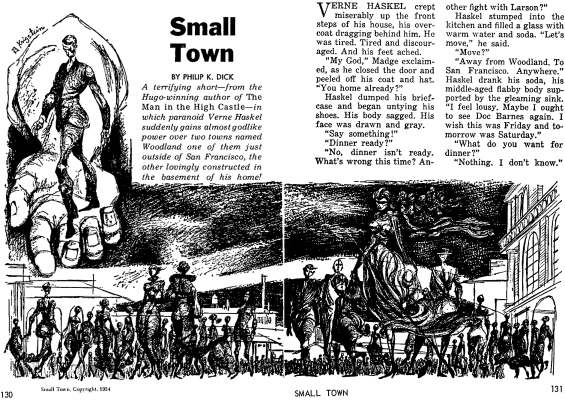
Small Town was first published in the May 1954 issue of Amazing Stories. Here is the copyright page from that issue:
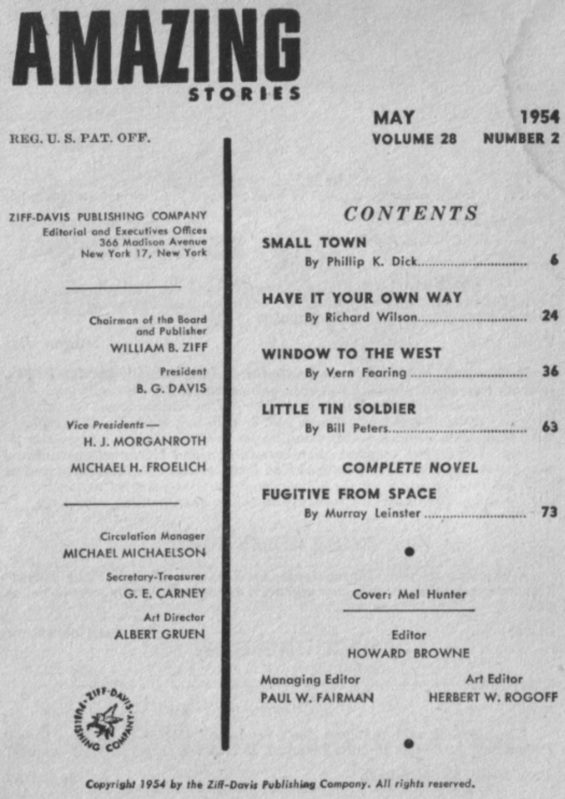
The fact that the story was not previously known to be PUBLIC DOMAIN is because there was a bogus copyright renewal claim made in 1983. In order for a claim to be properly renewed the first publication date must be cited in the renewal form. It wasn’t. Instead a false first publication date was swapped in.
RE190631 Page 2 (back) includes Small Town:
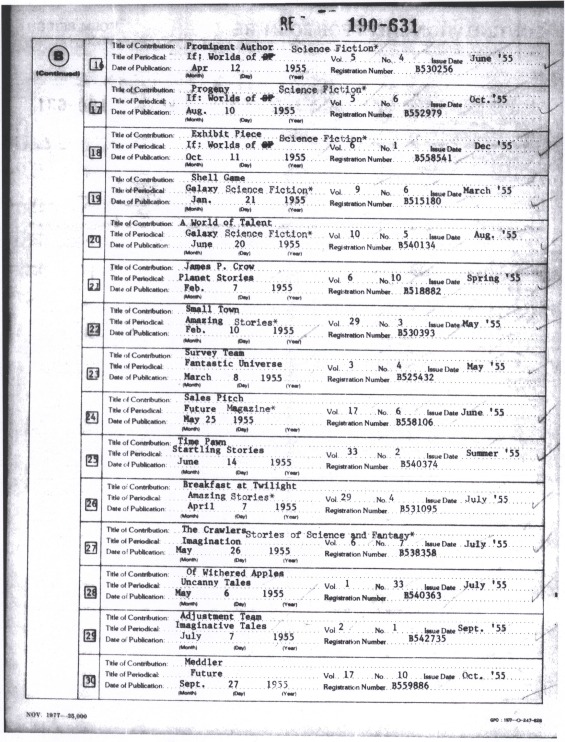
As you can see in a scan of the renewal form, pictured above, the renewer has stated that the story was published in the May 1955 issue of Amazing Stories. This is completely false. Here is the table of contents page from Amazing’s May 1955 issue:
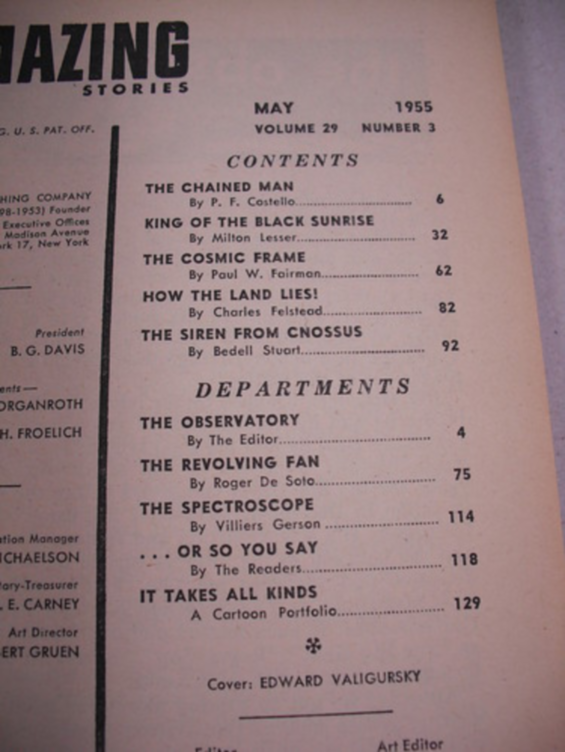
Had the renewer, in 1983, noted the actual first publication date of Small Town the renewal wouldn’t have been valid. By 1983 the copyright had lapsed.
The evidence for bad faith in the copyright process doesn’t end there. Indeed, while story was subsequently republished in Amazing Stories – perhaps lending credence to the idea that the renewer had merely mistaken the first publication for the second, the republication wasn’t until the April 1967 issue of that magazine. And of course a notation in that 1967 re-publication cites the story as having been copyrighted in 1954.
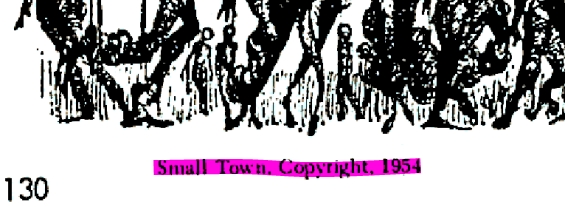
Small Town by Philip K. Dick is PUBLIC DOMAIN!
Posted by Jesse Willis
“The fact that the story was not previously known to be PUBLIC DOMAIN is because there was a bogus copyright renewal claim made in 1982. In order for a claim to be properly renewed the first publication date must be cited in the renewal form. It wasn’t. Instead a false first publication date was swapped in.”
“Had the renewer, in 1982, noted the actual first publication date of Small Town the renewal wouldn’t have been valid. By 1982 the copyright had lapsed.”
Jesse,
You’ve some important typos in the paragraphs quoted above. You typed “1982” when you meant “1983” and “1983” when you meant “1982.” Which reminds me to mention the publication dates aren’t the only mandatory information which is incorrect on the false “renewal” listings in RE0000190631. Sort of like a motor vehicle registration renewal requires more than one piece of mandatory identification (model, make, year, VIN, license plate number, owner, etc.) and they need to match up for the specific vehicle whose registration is being renewed.
Would you like a scan of the first pages of the original publication of “Small Town” in Amazing Stories, May 1954? Just an unconverted, unedited .jpg scan. There’s a .djvu version of the Small Town.djvu scan with a link at http://commons.wikimedia.org/wiki/Category:Philip_K._Dick which is awaiting proofreading for a text version to go in Wikisource. Artwork and introduction aren’t visible in that scan as Wikimedia Commons doesn’t allow fair use and those aren’t certainly United States public domain. Same artwork as the reprint. The only significant difference may be that the introduction was:
The theme of “the man who played God” has been used many ways in many stories, but never with more tense and chilling effect than in this tight little yarn by the very able Mr. Dick. You’ll like it, we’re sure.
_________
I wish to state that I am certain the person who signed the renewal application (Registration Number RE0000190631) was unaware of any false statements at the time or later and remind people he was not the type of literary executive who acts as literary agent and handles all the related business matters. He’d only been literary executor a short time and someone must have furnished him with some very specific information or, far more likely, prepared the the group renewal application he signed. He probably sent all the registration application related paperwork he had to someone else and may never have seen any of it again or even seen all of it even once. I don’t know who this would have been or whether it would have all been the same person (or entity). I can think of enough credible possibilities that I don’t think these statements can reasonably be interpreted as pointing a finger at anyone specific.
Regarding the story itself, I wonder if you see influence of Jung and Kant in it. I was going to write more about this awhile ago but was interupted. I see FCB has very recently mentioned those influences online regarding something else Dick wrote and he’ll likely stumble across this post or I’ll point him to it so I’ll hold off. He’s more knowledgeable and articulate than I am. He might even make an interesting podcast guest sometime. I’ve read some of his scholarly essays over the years and found them intelligent, insightful and remarkably accessible for literary criticism.
Yes please on the scans!
I’ve fixed the typos (I hope).
Here’s our next podcast, which is the story itself, and a discussion of it:
http://www.sffaudio.com/podcasts/SFFaudioPodcast153.mp3
Something may have timed out while I was sending the scans as email attachments. If you don’t get them, let me know and I’ll upload an archive to a file sharing site and send you a link to that.
” And of course a notation in that 1967 re-publication cites the story as having been copyrighted in 1954.” I’m not certain but think such notices were required by US law until early 1989; partly so people could identify parts of a compilation that had different copyright expiration dates than the compilation did or were already in the public domain and so interested people could learn who to contact about copyright permissions. If you look at the early printings of THE COLLECTED STORIES OF PHILIP K. DICK
Accidently clicked the submit comment button in mid-sentence. Resuming:
” And of course a notation in that 1967 re-publication cites the story as having been copyrighted in 1954.” I’m not certain but think such notices were required by US law until early 1989; partly so people could identify parts of a compilation that had different copyright expiration dates than the compilation did or were already in the public domain and so interested people could learn who to contact about copyright permissions. If you look at the early printings of THE COLLECTED STORIES OF PHILIP K. DICK you’ll see such information for each story though I’m not certain the form of notice was quite correct. The copyright/publication information matches what you’ll find in bibliographies and there are no stories with duplicate titles. If you look at the already published volumes of the latest printing I think you’ll find that information is omitted. I’ll try to look at library copies to verify this as I’m going by memory of a couple reviews that criticized lack of information about publication history of the stories.
Will try to listen to the podcast today. I wonder if any of the estate’s lawyers have already listened to it.